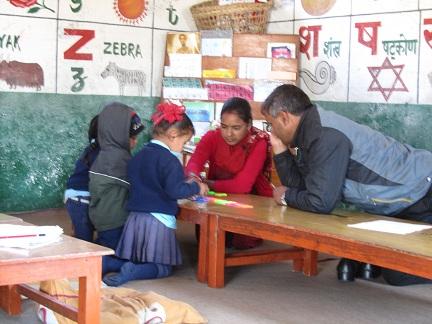
Mr. Adhikari has Twenty seven years of experience as a teacher, and 11 years as principal of Shree Sirjana Secondary School, Naudanda, Kaski. VSO Nepal supports government schools in Kaski to improve quality education. From April 2012 till April 2013 Shree Sirjana SS was provided with support on interactive teaching and learning strategies in the classroom as well as strengthening school leadership and management knowledge and skills through personal coaching by education advisor Petra Hoeve.
Quality education can be seen in two ways, absolute and comparative. But in today’s context it should be seen as comparative. Quality of education is established based on the variation of time, situation, geographical context, cultural, economical, social etc. Quality is perceived in many different ways. Quality in education is very different from the quality of other goods; especially as this is related to human aspects.
In the context of Nepal, quality and capacity enhancement are the main focus of VSO activities and various educational projects like “Education for rural development”. The objective of currently running programs, e.g. EFA and SSRP are also quality and relevancy.
According to Dr. Sureshraj Chalise “We started to say, quality education is similar to being far away from national language and culture, speaking a foreign language such as English fluently. Likewise the SLC examination is considered as a yardstick of quality, however it might not be “reliable”. Real quality has yet to be explored because it is considered as a result of the SLC exam.
“Education which helps to save our culture and fulfill our basic needs is quality education”. Likewise, establishing fundamental human value is also quality education. Quality should be seen not in the same way but in different perspectives. Quality education in Karnali may not be the same as quality education in Kathmandu, and should be measured based on the real situation of the people living in the area.
According to educationist Janarjan Sharma “The real quality of education is the ability to convert learnings into practice (learning by doing), ability to analyze a subject matter and complete from one’s own perspective of an assigned task in an excellent way”. In other words, quality education should help to develop different aspects of student’s such as knowledge, skill enhancement, norms, values and working habits to become a productive citizen.
When considering the above statements, quality education is related to producing capable citizen who is well equipped with knowledge and skills, is change oriented, aware of traditional norms and values, able to generate self-employment, is entrepreneurial, interested towards traditional professions, conscious, able to compete in a world market, ethical and well-disciplined socially with a good character. In our rural context, excellent results of the SLC exam is considered as a primary yardstick of quality education, and therefore value is not given to practical and productive education.
Consumers say that quality education is satisfaction through enjoying an educational opportunity. Availability of opportunity creates a situation of quantity whereas satisfaction and dissatisfaction through enjoy an opportunity creates a qualitative situation. Looking from another perspective, quality education is considered as: sentimental workability, ideal in social perspective, income generating in economic perspective, studious in educational perspective, rights oriented in political perspective, sellable in market perspective, aware towards caste and culture in cultural perspective, ability to use knowledge and skill of science in technical perspective, capable to be a global member and seize the opportunity in the perspective of globalization.
A few essential components are needed for a quality education:
1) Relevancy; 2) Effectiveness; 3) Efficiency; 4) Well-cultured; 5) Client Satisfaction; 6) Well-informed; 7) Accountability; 8) Equity; 9) Access; 10) Quality in Teaching; 11) Autonomy; 12) Quality outputs; and 13) Adequacy
Quality is multidimensional and multi-perspective and very difficult to measure. There is variation in opinion in analysing different aspects within internal and external expertise in the education sector. How can we seek quality? in education policy, in educational program, in curriculum, in text book, in classroom teaching, in school management, in results of exams, in pass out product, in response to the market, in the tasks carried out by the pass out students, in teachers or in the overall educational system by which quality can be maintained.
To do a microanalysis of quality education, it is necessary to analyze the investment, process output and impact.
Quality = Performance/Expectation










Add new comment